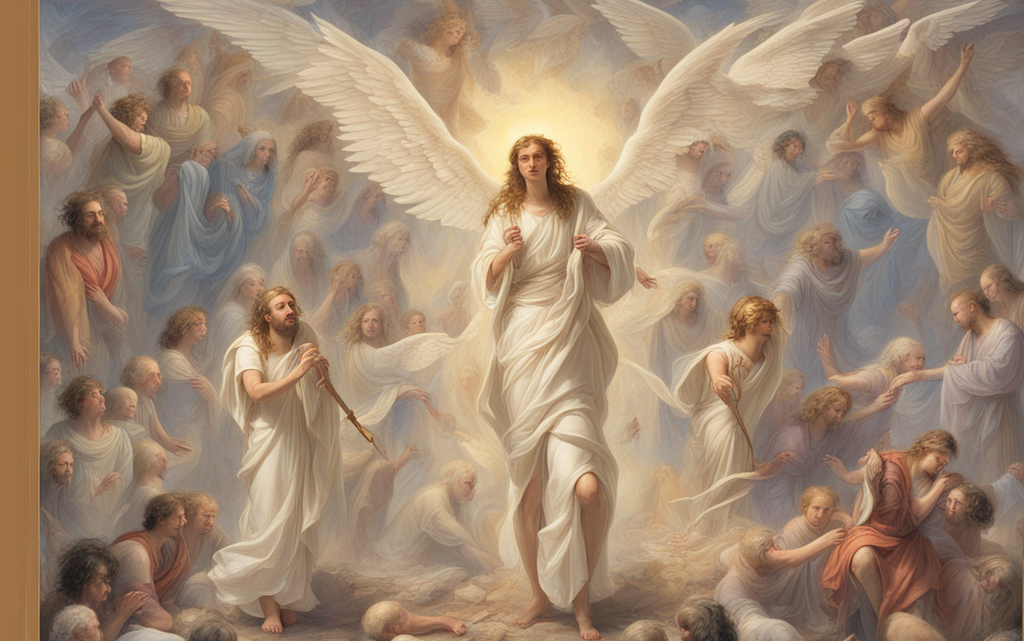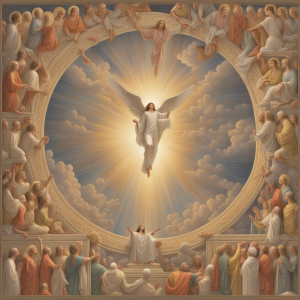Angelic Roles and Revelations in the Last Days: Insights from Biblical and Apocryphal Texts


The ethereal realm of angelic beings, as portrayed in Judeo-Christian traditions, is a complex and multifaceted concept. Both the Bible and apocryphal texts, notably the Book of Enoch, offer profound insights into the nature, hierarchy, and roles of these celestial entities. This exploration delves into these aspects, with a specific focus on their significance in the context of eschatology – the study of end times.
The Nature and Hierarchy of Angels: Angels, in the Judeo-Christian context, are spiritual beings created by God, serving as His messengers and agents. Their existence is affirmed in numerous Biblical passages, such as in Psalms (Psalm 103:20), where their obedience and power are highlighted, and in Hebrews (Hebrews 1:14), which describes them as ministering spirits.
The angelic hierarchy, as outlined in Christian theology, is complex. At the highest ranks are the Seraphim and Cherubim, known for their deep worship and proximity to the Divine Presence. Isaiah’s vision (Isaiah 6:1-3) beautifully illustrates the Seraphim, while the Cherubim are vividly depicted in Ezekiel (Ezekiel 10) and Revelation (Revelation 4:6-8).
In contrast, the Book of Enoch provides an extended view of the angelic hierarchy, introducing figures like Uriel, Raguel, and other angels who play specific roles in the governance of the heavenly realm and the earthly domain. Enoch’s narrative is particularly striking in its depiction of the Watchers – angels who descended to Earth, interacted with humanity, and profoundly influenced human history.
Roles of Angels in Scriptural Narratives: Angels are integral to various Biblical narratives, serving as God’s messengers, deliverers, and agents of His will. In Genesis, angels visit Abraham (Genesis 18) and wrestle with Jacob (Genesis 32:24-30). In the New Testament, Gabriel’s annunciation to Mary (Luke 1:26-38) highlights the angelic role in pivotal divine interventions.
In eschatological contexts, both the Bible and the Book of Enoch assign significant roles to angels. They are seen as key players in revealing the mysteries of the end times and executing divine judgment. Daniel’s visions (Daniel 8:15-26), John’s Revelation (Revelation 5:2, 20:1-2), and the vivid descriptions in the Book of Enoch align in portraying angels as central figures in the unfolding of the last days.
Angels as Protectors and Guides in the Last Days: The protective and guiding role of angels is a recurring theme. Biblical references, such as in Psalms (Psalm 34:7) and Matthew (Matthew 18:10), suggest angels guard and guide individuals. The Book of Enoch expands on this, illustrating their roles as overseers of the natural order and guardians of human affairs. This protective aspect becomes particularly poignant in the context of the tribulations and uncertainties of the last days.
Angels in the Book of Enoch: The Book of Enoch offers a unique and expansive view of angelology. It delves into the specific functions and transgressions of various angels, giving us an intricate picture of their influence on earthly and heavenly realms. The narrative of the fallen angels, their interaction with humanity, and the resulting consequences provide a profound backdrop to understanding the broader cosmic struggle between good and evil, as well as the role of divine justice.
Conclusion: The exploration of angelic beings through the prism of both Biblical scriptures and the Book of Enoch opens a window into the complex and awe-inspiring world of celestial entities. These texts collectively paint a picture of angels as powerful, multifaceted beings deeply intertwined with the human story and the divine plan, especially as it unfolds in the context of the last days. This study not only enriches our understanding of angelology but also offers insights into the broader themes of divine providence, judgment, and redemption.

